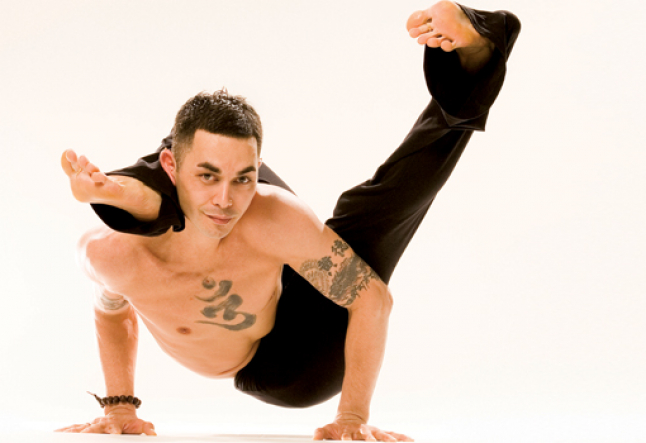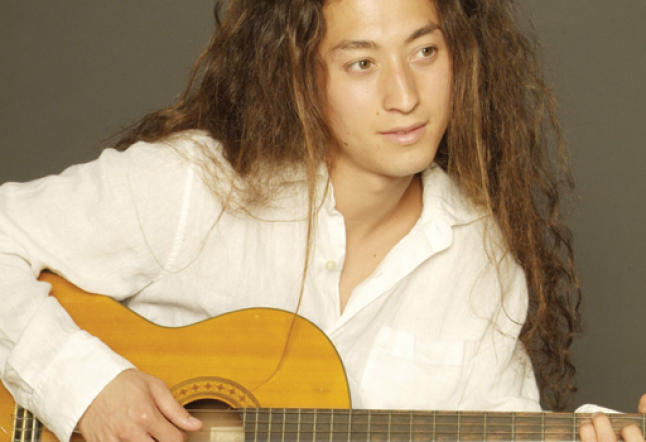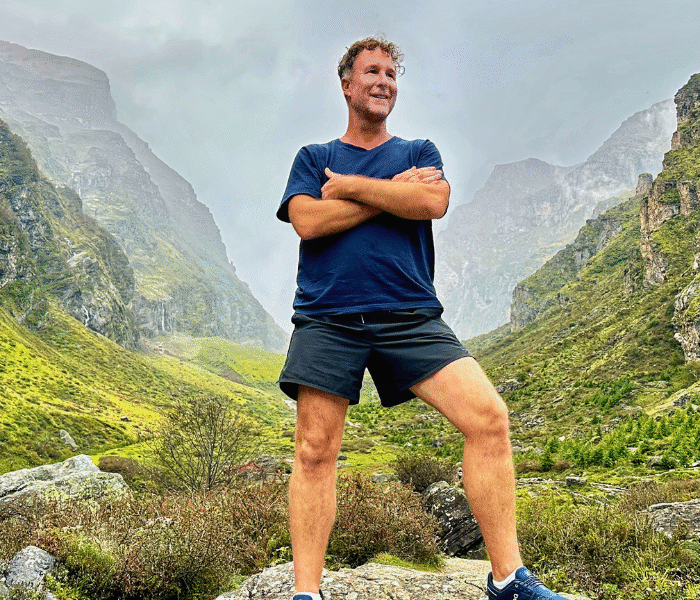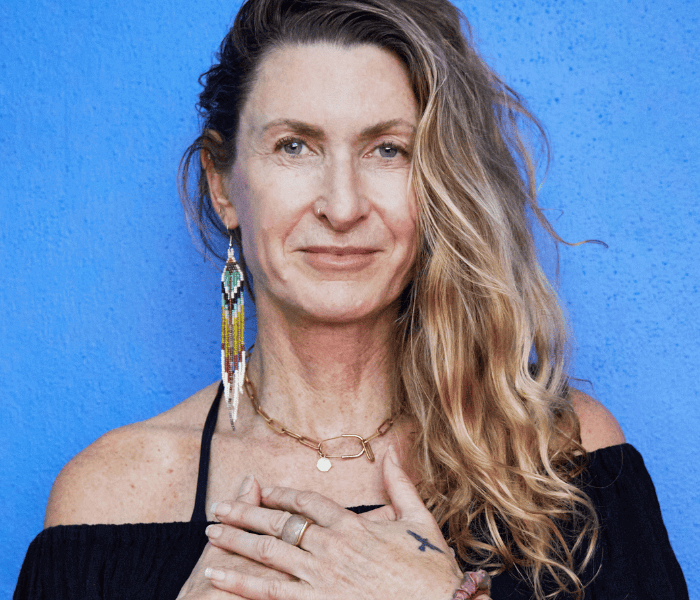Interview with Annie Carpenter
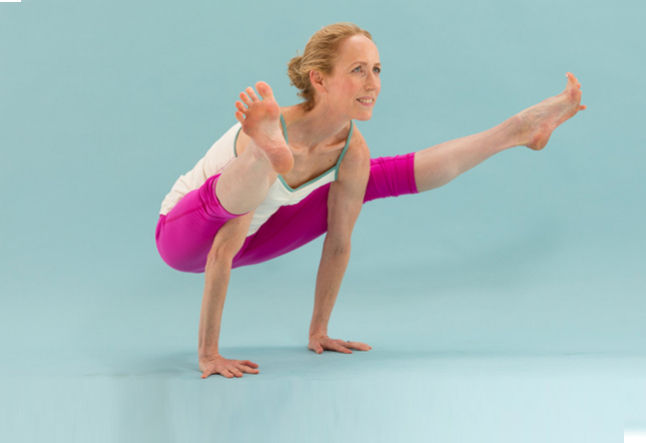
About yoga as a refuge, kindness and SmartFLOW
Dedicated to yoga and to inspiring and making her students grow, Annie has an immense knowledge of the body and spirit. If you were lucky enough to take Annie’s class, you will know that her teaching style is different. It is bold and honest, but at the same time very loving and kind. She will challenge you and you may not always ‘like’ her but if there is one thing you can be sure of, it’s that she always wishes the best for her students.
I had a great pleasure to sit down and talk to her about yoga as a refuge, being kind, the human ego and her teaching method – SmartFLOW.
Aleksandra Milewicz: Standard question to start with: how did you find yoga? Or, perhaps, how did yoga find you?
Annie Carpenter: I didn’t use to tell this story. When I was a teenager I had problems with drugs and they sent me to a treatment program where we had yoga. I was about 16. The guy who was teaching yoga in this after-school program, studied Integral Yoga of Swami Satchidananda so it’s very soft. This is in the 70s’ so there are no yoga mats yet, no one has a mat, we all practice on a carpet with towels. And I loved it.
In the feeling of after yoga I didn’t feel like I wanted to get stoned or take drugs and so it really worked. Even though I had another career, I danced for many years, I always did yoga on the side, it was my refuge. Especially when I was in New York where it is a very competitive, fierce environment.
I am a very quiet, shy, introvert person so having to bring so much to be a successful dancer, which I was very lucky to say that I was, was a lot. At the end of the day I went back home down town and went to the Integral Yoga studio almost every day. Back then yoga was about an hour and fifteen minutes with a lot of chanting, meditation and some movement. I don’t think I would have survived it, had I not had the yoga. Yoga has always been a refuge, a sanctuary and much later it also became my work.
AM: Can you talk a bit about SmartFLOW and your yoga teacher training how they’re different from the rest?
Annie Carpenter: Couple of things about SmartFLOW, first of all, it is not a formula. I think in a lot of teacher trainings you learn: ‘put this foot here, look this way’ and you learn how to sequence. Either it’s a set sequence or a formula.
In SmartFLOW you learn a series of what I call ‘movement principles’ and each movement principle is designed in such a way that each person can explore this particular aspect of movement to an extreme one way or the other, so it’s a continuum. So each person finds their place on this continuum. It is built in philosophically as you teach asana for each person to have the inquiry ongoing to what’s best for them, of who they are.
Every instruction you give, you could teach an advanced practitioner and a beginner at the same time because the inquiry of personal expression along the continuum. The sequencing is based on movement principles so you have to work and learn the principles.
It’s not an easy training but you learn the methodology and you can create very fun, interesting and creative sequencing. Every day you can do a different sequence that is intelligent, that bring a person in a clear arch energetically, physically and mentally. There is a slow quiet, soft inquiry to begin, you work up to very strong expression of poses, each person finds their way, and long returning to centre so when you land in savasana you’re already THERE.
I believe there are great teacher trainings out there, I used to teach for a big company and it was good but I do believe that what sets SmartFLOW apart is the method that you study and you learn and you can take it as deeply as you’re ready. I also believe that the emphasis on the self-inquiry is that we teach about the spiritual concepts of yoga, about being kind, kind to yourself before we know how to be kind to others.
AM: How do you balance yourself between the spiritual and material world?
Annie Carpenter: When I was younger I was probably more interested in balancing on one hand than I was in knowing the spirit within.
I think that that is a necessary process we all go through but I do believe it is an inevitable process, if we continue to practice, to be more and more interested in the trust, the spiritual truth, that I’m not this body, that I’m not even these thoughts, that ego is a construct that I need, to get through the world.
I have to have an ego. But can we discern that this ego is not the truth of who I am. And I think if you continue to practice, the ego presents itself to you, in not very nice ways and so we learn to chose to look inward. We learn to say to the ego ‘you are not real’ and appreciate the fact that we have one, that we can have a job, we can support our family, we can move in the world in positive ways.
AM: Any practical ways to maintain that balance, any ‘rituals’?
Annie Carpenter: Pranayama and meditation. Asana is necessary to keep the body healthy. But it’s the pranayama that focuses the attention and meditation that teaches you the truth.
AM: What advice would you give to someone considering becoming a yoga teacher?
Annie Carpenter: When I started teaching, there was no career, we taught for free so I really watched this change over the years. You will become a good yoga teacher if you wish the best for your students. Not the best poses but the true happiness, not for self, or for physical fitness. Your motivation shouldn’t be anything less than ‘I want my students to be happy’, if you have that in your heart, you will be a great teacher. Look for kindness, see kindness, encourage kindness. We may call it love.
AM: Do you feel like sometimes you have to make your students uncomfortable, push them out of their comfort zone and they may not always like you?
Annie Carpenter: Great question. I don’t think people like me. Sometimes I call myself ‘the alarm clock’. It is my job to keep you awake. Very often I walk around the room and see someone who god knows where they went to, then I come: ‘wake up!’.
It is the job of a true teacher to keep the students fully awake to what the true work is. Many of us hide behind things that are more comfortable. It’s not my job to be your friend, it’s not my job to make you like me, it’s my job to wake you up so you can wake yourself up.
AM: What else makes a good teacher?
Annie Carpenter: Self-practice. When people can feel our dedication to practicing every day, they are inspired to practice. They come back and they bring friends, then you have a full room, and you quit your bartender job (laughs), or whatever you do. It’s all about practice. Practice, practice, practice.
AM: Is there anything you noticed that has changed in the growing yoga industry, anything that bothers you?
Annie Carpenter: We could wish that this was different and that was different. We could hope that everyone who steps on the mat for the first time in their life understood that it was really a spiritual practice but it’s not like that. It wasn’t like that for me. Maybe one person in million understands right away it’s a spiritual practice.
I think that rather than thinking that something is not good or wishing that it was different let’s flip that over and celebrate the fact that any yoga is good yoga.
Although… I never really understood naked yoga (laughs)! I would be busy looking at body parts, it would be hard to focus. It distracts from the real purpose of yoga but I think it’s a better attitude is to say ‘they’re practicing yoga and that’s a good thing’ and we can just hope, and, I think they probably will, go deeper and deeper. Well, more and more yoga is a good thing.
AM: Any funny yoga stories?
Annie Carpenter: I have one but it’s…private. One of the things that I love about yoga is the community. And when one is in a lucky place in one’s life, one gets to practice every day with the same people. For me, for eight years, six days a week, I practiced next to this guy, we were not close, he lived very far away from me, he had a wife and kids and I had a long-term partner.
There was nothing between us, I had no idea what his life was like.
One day, I’m in the class and he says: ‘Annie, aren’t you on your period? You’re not supposed to practice on your period.’ And I said: ‘Do you even know when your wife’s period is?’ (laughs). He said: ‘No’. This intimacy that we have that is not about stuff, what car you have, what your career is, how much money you make..
We knew each other, we knew our rhythms, we knew what mattered. That kind of intimacy is rare in this world and I feel blessed to be able to be in communities where people share what really matters.
AM: Thank you Annie. It was a pleasure to capture your words of wisdom.
